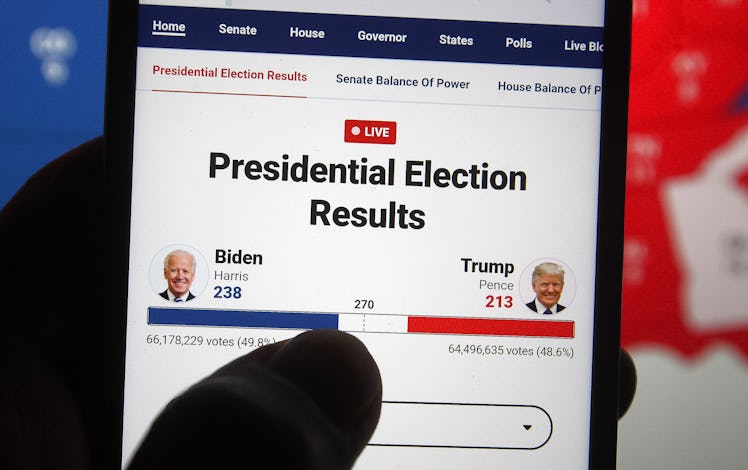
Here's The Low-Down On When Election Results *Need* To Be In
Unfortunately, it could be a while before the United States is able to hear any definitive 2020 presidential election results. Laws on when states can begin counting mail-in votes vary, skewing and slowing down the final numbers significantly. But how much longer can this waiting game really go on? Well, if you take a look at the nitty-gritty of election result deadlines and confirmations, things still seem a little... complicated. And a lot of how soon the nation will have a confirmed result hinges on several battleground states.
Despite what you might be thinking, there is no law mandating that the election must be decided on election night, or in the days that immediately follow for that matter. In fact, the numbers and "results" you see on election night are largely just projections, or estimations based on extensive reviews of voting data, according to NPR. In reality, the full picture isn't available until a state's election officials count every ballot — including in-person votes, early votes, and mail-in votes.
The reason election results are coming significantly slower in 2020 than in years past is thanks, in large part, to the surge of absentee ballots from the ongoing coronavirus pandemic. States have differing laws regarding the order and timeline by which they can count absentee and early votes, which is why the numbers continue to change in several key battleground states, like Michigan, Pennsylvania, Georgia, Wisconsin, and Nevada.
Though things may change, depending on how long each un-called state takes to count remaining ballots, several state officials have offered up an estimation on when more definitive election results may come. In Pennsylvania, Secretary of the Commonwealth Kathy Boockvar said in late October that votes may still be counted in the state potentially as late as Friday, Nov. 6. The New York Times reports that absentee ballots in Pennsylvania can arrive by Nov. 6, assuming they were postmarked by Election Day.
In Michigan, election officials expect to have a clearer picture of a winner by the night of Nov. 4; Georgia Secretary of State Brad Raffensberger gave a similar timeline on Oct. 27. The wait to hear final results in Nevada may be a bit longer, as the state is accepting mail-in ballots until Nov. 10, and it didn't begin counting absentee ballots until after polls closed on Election Day. Though a majority of the vote is almost counted in Wisconsin, Milwaukee county may hold up the results until further into Nov. 4. The county had the highest number of citizens request absentee ballots, according to Kenosha News, and in some cities, those ballots are counted separately.
According to Ballotpedia, the process by which election results are finalized involves canvassing (states confirming the ballots cast are valid) and certification (formalizing the results post-canvassing). Like pretty much everything regarding the election process, certification deadlines vary by state. For the majority of states, including Washington D.C., the deadline is sometime between Nov. 10 and Nov. 30. The deadline extends as late as December in 14 states. Heck, four states — Hawaii, Tennessee, Rhode Island, and New Hampshire — technically don't even have an established deadline. In 20 states, a winning margin too small could result in a recount. In a whopping 43 states, a candidate can request a recount, also assuming margins are tight. As you might've expected, a recount can drag out a final result even further.
Ultimately, a state should submit its Electoral College vote by Dec. 23, 2020. Otherwise, the current vice president will request the records from state officials, per Ballotpedia. Congress is then set to meet for a session to count the total electoral votes on Jan. 6, 2021, during which members may object to the findings. If there is a clear winner of 270 or more electoral votes, the current vice president announces a final winner, who will be inaugurated on Jan. 20, 2021.
Now, the million-dollar question: What if there is still no final result by Inauguration Day? Well, a couple things can happen. If neither candidate received a majority of the electoral votes, then the House will elect the president, while the Senate will elect the vice president, according to the 12th Amendment. If the issue moves to the Supreme Court and isn't resolved by Inauguration Day, the Speaker of the House would assume the presidency, given that a new Congress was already sworn in.
As of 10:50 a.m. ET on Nov. 4, the race could still go to either candidate, so as these deadlines dictate, a final result could be a long way away.
Editor's Note: At 11:30 a.m. ET on Saturday, Nov. 7, the 2020 election cycle came to an apparent close, as multiple news sources called the 2020 presidential race for Joe Biden. Per projections, Biden won the state of Pennsylvania, whose 20 electoral votes put him over the 270 vote threshold to win the election.